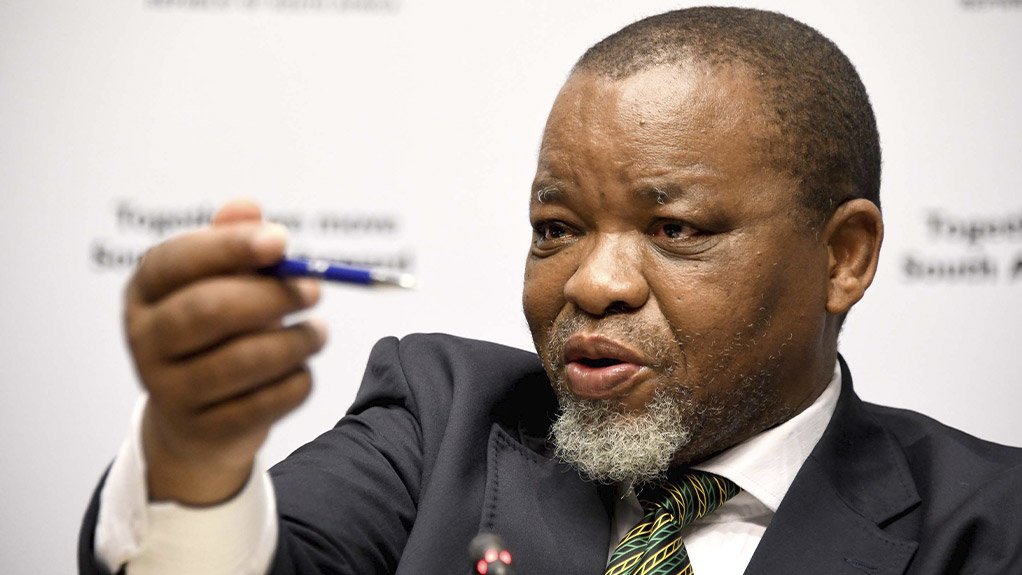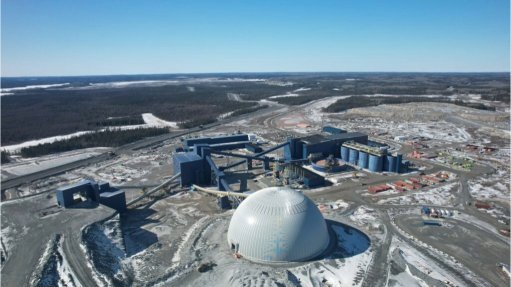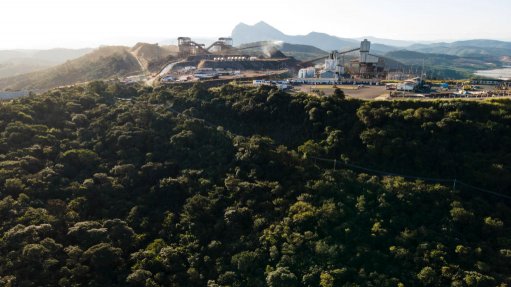DMRE prioritises regulatory review
JOHANNESBURG (miningweekly.com) − The Department of Mineral Resources and Energy (DMRE) on May 7 briefed the Portfolio Committee on Mineral Resources and Energy on its annual performance plan for the 2020/21 financial year, as well as its strategic plan for the medium-term expenditure framework.
Mineral Resources and Energy Minister Gwede Manthashe said the department remained cognisant of the major disruptive developments that had impacted on the mining industry.
These include the impact of Covid-19-related lockdown measures on the economy, the oil price, the currency exchange rates and downgrades by the ratings agencies of South Africa’s sovereign rating.
DMRE director-general Advocate Thabo Mokoena tabled the department’s plan during the briefing, reporting that the department’s spending would amount to R9.3-billion for the 2020/21 financial year.
As part of the department’s reconfiguration since the amalgamation between the Department of Mineral Resources and the Department of Energy, in 2019, the DMRE has reduced its structure from eleven branches to six.
These branches now comprise corporate services; mining, minerals and energy policy development; minerals and petroleum regulation; energy programmes and projects; nuclear energy regulation and management; and mine health and safety inspectorate.
In terms of the 2020/21 budget, corporate services has been allocated R642-million; mining, minerals and energy policy development has been allocated R993-million; minerals and petroleum regulation has been allocated R537-million; energy programmes and projects has been allocated R5.7-billion; nuclear energy regulation and management has been allocated R1-billion; and mine health and safety inspectorate has been allocated R232-million.
The administration budget will comprise R365-million for employee compensation, R255-million for goods and services, R3.5-million for transfers and subsidies and R17-million for capital assets.
The minerals regulation budget will comprise R302-million for compensation, R70-million for goods and services, R201-million for transfers and subsidies and R45 000 for capital assets.
The policy development budget will comprise R126-million for compensation, R54-million for goods and services, R811-million for transfers and subsidies and R99 000 for capital assets.
The energy programmes budget will comprise R103-million for compensation, R136-million for goods and services, R5.5-billion for transfers and subsidies and R82 000 for capital assets.
The nuclear energy budget will comprise R26-million for compensation, R11-million for goods and services and R1-billion for transfers and subsidies.
The mine health and safety inspectorate budget will comprise R192-million for compensation, R37-million for goods and services, R2.4-million for transfers and subsidies and R812 000 for capital assets.
Meanwhile, Mokoena said the mining industry continued to be critical for achieving the economic growth, job creation and transformation objectives of the country.
South Africa’s Mining Charter is aimed at increasing investor certainty and distributing the industry’s wealth more equitably.
“A lack of investment in mining, together with poor economic performance, has adverse implications along the mining and minerals value chain,” Mokoena said.
He further noted that research in the mining and energy sectors was critical to support the targeted outcomes and the DMRE would pursue options to expand the mandates of the respective State-owned enterprises to support research in mining and energy.
Mokoena believes this will contribute to an increase in the competitiveness of the South African mining industry, enabling the country to be accessible to and better able to compete in regional and global markets.
“Investment in research is required to address the lack of innovation and the impact on mining beneficiation and skills development that could hinder progress to improve the country’s manufacturing capability.
“To create access to minerals for beneficiation, the necessary licensing conditions need to be created. Section 50 of the Mineral and Petroleum Resources Development Act will be revisited to help increase domestic beneficiation.”
The DMRE’s presentation notes that licensing turnaround times will be addressed by reviewing and strengthening relevant legislation.
Capacity in terms of human resources will be increased and licensing processes and timelines will be reviewed. These interventions are also aimed at increasing economic participation, ownership, access to resources and opportunities, and wage equality for women, youth and persons with disabilities.
With regard to exploration activities, the Council for Geoscience will fast-track the implementation of the Geoscience Technical Programme by 2021, to catalyse investment in exploration.
The DMRE is also focusing on the concentration of petroleum and minerals. Mokoena said it would be necessary to encourage partnerships between emerging junior miners, and conduct a legislation review of the Petroleum Bill to encourage inclusive, equitable and competitive exploration.
The requirement for an optimal legislative framework for petroleum will be addressed by expediting the legislative processing framework, specifically the process involving the National Council of Provinces and the National Assembly.
With regard to mine health and safety, the DMRE targets a 30% reduction in occupational fatalities by reviewing legislation and enforcement of legislative frameworks.
The security and safety of women in mining in relation to gender-based violence is a high priority, with a long-term timeline, and will be guided by the implementation of guidelines and directives to create a working environment conducive for women in mining.
The DMRE will lead and facilitate the enabling policy and regulatory interventions required to ensure that the energy and mining sectors make meaningful contributions to national objectives and medium term strategic framework targets.
The department’s strategic objectives remain to invest in accelerated inclusive growth and industrialisation, localisation and export promotion, as well as greenhouse gas reductions and improving geological infrastructure.
Comments
Press Office
Announcements
What's On
Subscribe to improve your user experience...
Option 1 (equivalent of R125 a month):
Receive a weekly copy of Creamer Media's Engineering News & Mining Weekly magazine
(print copy for those in South Africa and e-magazine for those outside of South Africa)
Receive daily email newsletters
Access to full search results
Access archive of magazine back copies
Access to Projects in Progress
Access to ONE Research Report of your choice in PDF format
Option 2 (equivalent of R375 a month):
All benefits from Option 1
PLUS
Access to Creamer Media's Research Channel Africa for ALL Research Reports, in PDF format, on various industrial and mining sectors
including Electricity; Water; Energy Transition; Hydrogen; Roads, Rail and Ports; Coal; Gold; Platinum; Battery Metals; etc.
Already a subscriber?
Forgotten your password?
Receive weekly copy of Creamer Media's Engineering News & Mining Weekly magazine (print copy for those in South Africa and e-magazine for those outside of South Africa)
➕
Recieve daily email newsletters
➕
Access to full search results
➕
Access archive of magazine back copies
➕
Access to Projects in Progress
➕
Access to ONE Research Report of your choice in PDF format
RESEARCH CHANNEL AFRICA
R4500 (equivalent of R375 a month)
SUBSCRIBEAll benefits from Option 1
➕
Access to Creamer Media's Research Channel Africa for ALL Research Reports on various industrial and mining sectors, in PDF format, including on:
Electricity
➕
Water
➕
Energy Transition
➕
Hydrogen
➕
Roads, Rail and Ports
➕
Coal
➕
Gold
➕
Platinum
➕
Battery Metals
➕
etc.
Receive all benefits from Option 1 or Option 2 delivered to numerous people at your company
➕
Multiple User names and Passwords for simultaneous log-ins
➕
Intranet integration access to all in your organisation





















